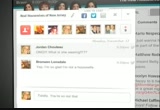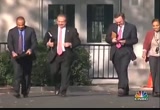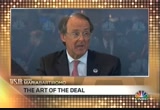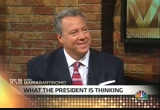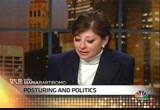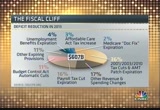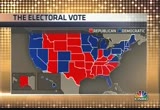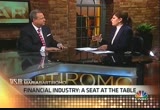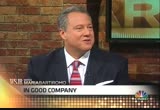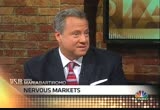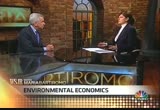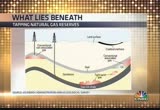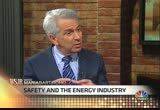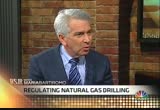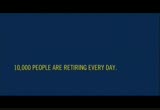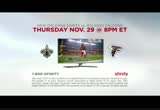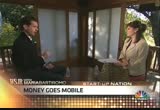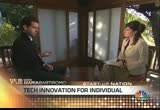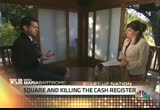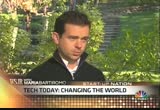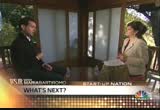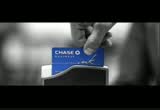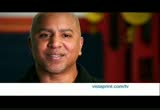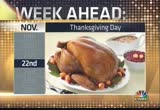tv Wall Street Journal Rpt. CNBC November 18, 2012 7:30pm-8:00pm EST
7:30 pm
download zeebox free, and have the night of your life with your tv. hi, everybody, welcome to "the wall street journal report." the wall street democrat who has the president's ear. we'll talk to him about the fiscal cliff, compromise and the odds of a deal happening. america's energy independence and the environmentalist who says fracking is here to stay. but just how do we make it safe? we'll drill down to get some answers. and then the man who many in the technology world call the next steve jobs. you're probably already using something this quiet genius already invented. "the wall street journal report" begins right now. >> this is america's number-one financial news program. "the wall street journal report." now, maria bartiromo. >> here's a look what's making news as we head into a new week on wall street. corporate america had a strong message for president obama this week. ceos from more than a dozen of america's largest companies met with the president and warned
7:31 pm
that washington must reach a deal to avoid the fiscal cliff. the president also sat down with congressional leaders and officially began negotiations. if congress doesn't act, taxes on income, capital gains, dividends and estates will all go up. and automatic spending cuts will kick in, beginning on january 1st. this week, i spoke with alan simpson and erskine bowles, authors of a deficit reduction plan about what needs to be done. >> you can't tax your way out of this. you can't cut spending your way out of this. you can't grow your way out of this. so grab hold, it's going to be a rocky, rocky road. >> so you're saying closing the loopholes alone brings it to a trillion. >> if you're willing to wipe out all of them, and that may not be political feasible, but you can definitely solve the problem by broadening the base, simplifying the code and getting rid of the tax expenditures. >> it upsets me you're worried we're not going to get a deal because that's how i felt. >> i think there is a one-third probability we'll get a deal in lame duck, one-third we'll go
7:32 pm
over the cliff and reach a deal right afterward but there is that one-third chance we won't and end up in chaos. >> we have felt for weeks and months no one would be dumb enough to let this happen and now they can see that it is indeed possible, to be as dull witted as possible this could happen and now they finally soared up. they were planning it to be done. no one had ever let this happen. it can't possibly be happen. well, merry christmas. >> the markets had a case of the fiscal cliff nerves and continued decline during the week. stocks down 5% since president obama was re-elected. retail sales disappointed in october, down .03% for the month. autos particularly hit hard. and it's likely superstorm sandy slowed business at the end of the month. well, he is a rare breed, a wall street insider who has the president's ear. what is president obama thinking these days? and what can we expect of the fiscal cliff negotiations? robert wolf is an outside adviser to president obama.
7:33 pm
a former president of investment banking at ubs and now ceo of the firm 32 advisers. robert, great to see you. >> great to be here, maria. >> thanks for joining us. so you are a rare breed. you're a top wall street executive, but you have a very close relationship with the president. so talk to us about this drama over the fiscal cliff. are we still in the positive touring stage? how does this play out? >> i hope it plays out with a deal. i would have probably put it around 80% a deal. but i would have sliced it this way. i would say 50% of that 80 is that they come up with, like, $60 billion. which is six months of the ten years of the $1.2 trillion sequester. >> okay. >> okay? >> so that's a drop in the bucket. >> a drop in the bucket. so you could do that. and is that would also i would think if you're doing that, you would have to say, okay, and we're going to pass the debt ceiling. that gets you until march, april, and it gets the new congress in, and it forms a good basis.
7:34 pm
>> now, what do you think about those reports on friday that the white house is now in advanced talks to replace the sweeping cuts set to begin in january with a smaller package. are they in advance talks, essentially delaying some of the harder decisions until into 2013? it feels like the president is digging in, he doesn't want to give on this, you know, not extending the tax cuts to the highest earners. and wants to take away the loopholes, as well as raising taxes. >> yeah, i mean, that all an approach, i think is going to get tough to get the votes. the all-in approach. i mean, i understand the president feels that you have to tax the 2%, because if you really look at the detail, if you tax -- if you don't extend it for the top 2%, that gets you about $750 billion over ten years. and then if you do some of the itemized deductions, that can get you to the trillion. >> and he wants $1.6 trillion. >> right. i mean, i'm not sure, you know, that, you know, he has the chance of getting 1.6.
7:35 pm
>> maybe that's a negotiating tactic. >> it could be. they all play a little poker. >> exactly. >> i would rather be in the boat where we go to the clinton era taxes from 35 to 39.6 than have this idea, maria, of tax deductions cannot be itemized greater than 50,000. because the truth is, the biggest hit on that is charity. it's about -- it's half of it. >> people will give away less. >> and i think that that's not where this country is. the second part is mortgage deductions. and i don't think that's necessarily good for this country. and then the third thing is it hits state and local. >> yeah. >> those are the three areas itemized deductions hit. so i'm not necessarily a fan of that. >> you think the president feels like he has a mandate and basically -- he said it, look, the majority of the people agree with me. or do you think he's going to say, okay, i want -- i have to give just to show that i'm going to give the way the republicans are going to try to give. on revenue. >> one, i think it's a couple
7:36 pm
different questions. i absolutely think he has a mandate. he did win. i don't think it's one of the scenarios where you do it my way, the highway at all. i think just the opposite. i think we had a lesson learned, okay in 2011 on the debt ceiling that you need both sides of the table. i think the president realizes entitlement reform has to be on the table. especially with medicare. and so there's no question from where i sit that, yes, i think he has to stick to his guns on some of the things he believes in and what he has campaigned on. but i also think he understands for us to get to $4 trillion, okay, taxes are probably not more than, you know, 25% of that. >> right, right. how are these meetings going? the president has been meeting with top corporate leaders this week. he met with the labor leaders the day before, talking about the fiscal cliff. what's coming out of these meetings, in your view? and what are your business colleagues saying in terms of how he's conducting the
7:37 pm
meetings, because a lot of times people would come on this program and say the president is not listening, we don't have a voice at the table. do they have a voice at the table? >> first of all, i think what's good about this is the private sector wants a voice at the table. you know, i think the one mistake we all made during the debt ceiling is we were relatively quiet. and this is a time we can't be quiet. so one, i do think the private sector is going to have a larger voice. and i think that the house and the senate and the president wants to hear from the private sector. two, there may be different ways to skin the cat. there's not just one answer. we know the number is $4 trillion, but there's other answers. as far as the meeting is going, good, i'm going down there to see valerie jarrett and gene spurlg with a group of other people. what i hear the meeting is going well. i have not heard about the meetings with congress yet. but i think the business leaders that i heard from that came back and said, listen, there was a good two-way and people know entitlement needs to be on, and the business leaders say they
7:38 pm
understand revenues need to be on. and most of them say, "i am happy to pay, okay, going to the clinton era 39.6," as long as it's balanced and there are spending cuts. i don't hear the business leaders yelling and screaming about taxes. >> what i am hearing, yelling and screaming from ininvestors over this uncertainty, lack of clarity of what the tax rates will be in 2013. the market is down 5% just in the last week, since the election, the market is down 5%. is that a fair statement, people are worried about this uncertainty and lack of clarity of where their tax rates will be next year? >> i don't think it's that fair. i'll tell you why. i think the market is down 5% for a few reasons. one is europe showed it's going back into a recession. okay. two, you had a change in china and leadership. we don't know necessarily what that means. three, yes, the fiscal cliff is a part of it, but there is a good chance people think taxes will likely go up or deductions go down. and there's four -- a lot of
7:39 pm
people are selling because they have gains, okay? i mean, so -- >> year-end -- >> year-end positions. but the other thing, i don't want to be naive. a lack of clarity is not good. >> all right. we'll leave it there. robert, great to talk with you. up next on the wall street journal report, behind the big business of fracking, tapping into america's natural gas resources. what are the economic and environmental costs? and later, the california entrepreneur behind twitter. how jack dorsey has changed the way we communicate. now he's looking at how you use money as we take a break, take a look at how the stock market ended the week. back in a moment. [ male announcer ] this is bob, a regular guy with an irregular heartbeat. the usual, bob? not today. [ male announcer ] bob has afib: atrial fibrillation not caused by a heart valve problem,
7:40 pm
a condition that puts him at greater risk for a stroke. [ gps ] turn left. i don't think so. [ male announcer ] for years, bob took warfarin, and made a monthly trip to the clinic to get his blood tested. but not anymore. bob's doctor recommended a different option: once-a-day xarelto®. xarelto® is the first and only once-a-day prescription blood thinner for patients with afib not caused by a heart valve problem, that doesn't require routine blood monitoring. like warfarin, xarelto® is proven effective to reduce the risk of an afib-related stroke. there is limited data on how these drugs compare when warfarin is well managed. no routine blood monitoring means bob can spend his extra time however he likes. new zealand! xarelto® is just one pill a day, taken with the evening meal. and with no dietary restrictions, bob can eat the healthy foods he likes. do not stop taking xarelto® rivaroxaban without talking to the doctor who prescribes it for you. stopping may increase your risk of having a stroke. get medical help right away
7:41 pm
if you develop any signs or symptoms of bleeding, like unusual bruising or tingling. you may have a higher risk of bleeding if you take xarelto® with aspirin products, nsaids or blood thinners. talk to your doctor before taking xarelto® if you currently have abnormal bleeding. xarelto® can cause bleeding, which can be serious, and rarely may lead to death. you are likely to bruise more easily on xarelto®, and it may take longer for bleeding to stop. tell your doctors you are taking xarelto® before any planned medical or dental procedures. before starting xarelto®, tell your doctor about any conditions, such as kidney, liver or bleeding problems. ready to change your routine? ask your doctor about once-a-day xarelto®. for more information including cost support options, call 1-888-xarelto or visit goxarelto.com.
7:42 pm
tapping into america's natural gas reserves. is it going to mean an energy-independent future? and is it safe? we are drilling down for answers rights now with fred krup, president of the environmental defense fund. fred, good to have you on the program. >> glad to be here. >> so the international energy agency this week said the u.s. will be the largest global oil producer in 2020. this is amazing. so tell me about this sea change in global energy flows today. >> it's great to have more american-made energy, but it's not good enough. we also need to modernize our energy grid. it's not good enough to just be the best at producing the energy the last century. and we are going to spend a couple trillion dollars modernizing the grid, and the question is how we do it. hopefully we do it in a way that protects us from cyber security risks that makes the grid more resilient from storms. that facilitates energy efficiency and renewable energy, cleaner energy in the future. >> you know, it's interesting,
7:43 pm
because i think we all want to be energy-independent. we want -- we know this country is rich in natural gas. but for the most part, people don't want it in my backyard and yet ge ceo jack with welsh compared it to the internet boom with job pro portion and increases. how do you balance it, the potential economic boom we could see of fracking, with the environmental impact? >> well, look. the economic advantages are obvious. we've created hundreds of thousands of jobs, because of cheap natural gas, electricity prices are low because of abundant and cheap natural gas. but the environmental impacts, if you go to the communities where this gas is being produced, are also obvious. i visited, maria, south of pittsburgh, a little town called washington with a woman who told me she had had to abandon her family farm because of the fumes from a neighboring well made her kids sick.
7:44 pm
she was living out of her car. so we need to put in place the strong rules to allow us to do the fracking but do it safely so that no one has to sacrifice their health for cheap energy. >> this is a horrible story and i'm really glad you brought it up, because we have seen stories of people lighting matches by the water running, small working-class communities being impacted by energy companies and potential buyouts. what are the most provable, damaging side effects to fracking. >> there are risks to water contamination. not so much through the fractures, but through spills on the surface or leaks through the drilling shaft. also, what happens to the waste? where do you get the water? if you get all this water out of a big river, not much impact. if you take it out of a trout stream in an arid region, that's a big problem. and then we have the question of global warming. because while everyone knows that natural gas when it burns
7:45 pm
is cleaner than burning coal, when it escapes from the wells or the pipes unburned, it's 70 times more dangerous than carbon dioxide for the first 20 years so we've got to close the leaks in the system and use it as a fuel. >> so what can be done, specifically, to bring all the groups together? the energy industry, federal government, state government, as well. how do you bring everyone together to ensure that we are doing this safely in the most efficient way possible? >> well, we've got to find the common ground, how to do it safely. so the environmental defense -- >> can you do it safely? >> i believe you can really minimize the risks. we, the environmental defense fund, has partnered with southwestern energy, and together we've developed a model rule for state governments to use to make sure that the wells are drilled safely so that they don't leak into the surrounding aquifer. that model rule served as the basis for governor kasich in
7:46 pm
ohio, for his proposal to the state legislature. so we are making progress with some of the energy companies who realize, it's in their best interests if everyone is brought up to a level that this is done safely. >> fascinating. fred, good to have you on the program. thanks very much. >> thank you, maria. >> very insightful and appreciate your time. fred krup joining us. up next on "the wall street journal report" the programmer who turned twitter into a household name. jack dorsey wants to kill the cash register now. all part of the next disruption. people have called you the next steve jobs. is that how you see yourself? [ lopez ] when i first started working, i put away money. i was 21, so i said, "hmm, i want to retire at 55." and before you know it, i'm 58 years old. time went by very fast. it goes by too, too fast. ♪ but i would do it again in a heartbeat. [ laughs ] ♪
7:47 pm
♪ ♪ ♪ [ male announcer ] they are a glowing example of what it means to be the best. and at this special time of year, they shine even brighter. come to the winter event and get the mercedes-benz you've always wished for, now for an exceptional price. [ santa ] ho, ho, ho, ho! [ male announcer ] lease a 2013
7:49 pm
some say cash is king. but is it raining on borrowed time? the startling speed at which technology makes many parts of our lives more efficient is changing the way things are bought and sold, as well. last week at a gathering of influential technology ceos, i spoke to entrepreneur jack dorsey about his rapidly growing three-year-old company can, square. he's trying to put your money where your mobile is. >> when i was 8, i had a business card that said jack dorsey consultant. >> at 35, twitter's creator jack dorsey hopes his mobile payment start-up square, will change the relationship you have with your wallet. >> money, as a concept, has been with us for 5,000 years. it started with us trading seashells. and it touches every single person on this planet. and at one point in someone's
7:50 pm
life, every single person on this planet feels bad about it. feels like a burden. so how do we remove that burden completely and make it feel like something that really gets them to an end, which is an experience they want to have or service or product they want to buy? >> talk to us about square and what it is enabling. >> less and less people are carrying cash. they're not carrying their checkbooks anymore. they're carrying these plastic cards everywhere. so square originally was a little tiny device you plugged into your mobile device, your ipad, your iphone, android device and it would allow you to accept credit cards instantly and the money would go to your bank account directly the very next day. >> it's such a great idea and because of that, you've got other companies nipping at your heels. so you've got folks like intuit and paypal wanting to do what square does. >> our focus has always been around not just payments, but the entire commerce experience, the entire buying and selling experience. if you look at just payments, then you're looking just at the payer and the payer is actually
7:51 pm
just someone who does some mechanical thing. and we wanted to remove all the mechanics of payments. we started with individuals, but we wanted to build a utility that scales between someone just wanting to sell something at their yard sale with a credit card, but also to the largest organization in the world, and starbucks validated that last week by bringing it to every one of their stores in the united states. >> walk us through how that works. i go into a starbucks, what do i do? i just say hi, it's maria, i want a latte? >> to start, you download square wallet for your phone. and then you find the starbucks in the directory and your closest starbucks and go up and say, i would like a double tal latte, and you simply show your phone to the scanner, there is a quick beep and they hand your coffee and you walk away. it's very, very simple. >> no questions asked. i have my coffee, i've paid, the cash register is dead. >> yes, yes, yes. the cash register is moving more and more off the counter and into the buyer's hand and that's the most amazing thing.
7:52 pm
is the buyer is completely in control of the transaction. so it's the device, the payment device is not leaving their hand at all. and that is the most secure transaction that you can have. >> so you also co founded twitter, which also has sort of changed the world in a different way. is there a thread between at which timer twitter and square in terms of what's similar and what they're tapping into? >> i think the common thread is simplicity. twitter made it very, very simple to have a conversation with the world. by updating what's around you and sharing what you're seeing or what you're experiencing. and the entire world can then participate in that and have a conversation with you. and square really simplified getting into commerce, so both have simplicity, both have very, very broad utility where an individual can can come to each service and make it their own but also the largest organizations in the world, like a starbucks or the u.s. government can can use something like twitter to really broadcast their message and make it feel
7:53 pm
smaller, make it feel more personal. >> and where are you looking to take square? it's valued at what, $3 billion? what's the exit strategy? how do you know when it is time to go public? and open this up? >> well, i think you can think about an ipo as an exit strategy. you can think about it as a goal. or you can think about it as a milestone. and we think of it more as a milestone. but you don't stop there. you just keep going and going and going and building and building. and both companies want to build something that's sustainable, that lasts beyond one generation of a human life. and something that really makes a deep impact on the world. >> if this here was full of innovations about communications and, of course, square about the exchange of payments, what's the next wave? >> i think the two major trends you've seen for the past, you know, 40 years is going from these super computer isolated examples to actually having the same technology right in your hand. it allows us information faster,
7:54 pm
allows us action faster. and it surfaces both in a much more compelling way so that i believe that people can can really focus on what's most meaningful and the technology disappears and is additive when we want it to be. >> people have called you the next steve jobs. is that how you see yourself? >> not at all. i see -- you know, steve has been a great inspiration for our industry. but the best thing that he ever said was that you have to follow your own path. you have to make your own path. and you have to come reinvent yourself and innovate. so we're taking our own path. >> my thanks to jack dorsey. up next on "the wall street journal report" we take a look at the news this upwomaning week that will have an impact on your money. if you think running a restaurant is hard, try running four. fortunately we've got ink. coming week that will have an impact on your money.
7:55 pm
7:56 pm
we don't let frequent heartburn come between us and what we love. so if you're one of them people who gets heartburn and then treats day after day... block the acid with prilosec otc and don't get heartburn in the first place! [ male announcer ] one pill each morning. 24 hours. zero heartburn. n you take a closer look... ...at the best schools in the world... ...you see they all have something very interesting in common. they have teachers... ...with a deeper knowledge of their subjects. as a result, their students achieve at a higher level. let's develop more stars in education. let's invest in our teachers... ...so they can inspire our students. let's solve this.
7:57 pm
for more on our show and guests, check out the website, wsjr.cnbc.com and i hope you'll follow me on twitter and google plus. now the stories coming up in the week ahead that may move the markets and impact your money this week. earnings reports are out from hewlett-packa hewlett-packard, lowe's and best buy. on tuesday, we get the housing starts number. residential units that began construction last month. and federal reserve chairman ben bernanke will speak to the economic club of new york, also happening tuesday. thursday is thanksgiving. happy turkey day, everybody. all markets are closed for the holiday.
7:58 pm
and then on friday, it is here! can you believe it? the kickoff to the holiday shopping season will begin the day after thanksgiving. and in some cases, on thanksgiving night. that will do it for us for today. thank you so much for being with me. next week, instead of leftover turkey, how about joining me for an italian feast with new york's first family of fine dining? from le sirk to linguine. they keep it in the family. we'll take you there. keep it here where wall street meets main street. have a great week, everybody. i'll see you next weekend. from 17 billion chips worldwide to a world of super-connected intelligence. the potential of freescale unlocked. nyse euronext. unlocking the world's potential. to investing with knowledge. the potential of td ameritrade unlocked.
7:59 pm
nyse euronext. unlocking the world's potential. (car horn) paying with your smartphone instead of cash... (phone rings) that's a step forward. with chase quickpay, you can send money directly to anyone's checking account. i guess he's a kicker... again, again! oh, no you don't! take a step forward and chase what matters.
188 Views
IN COLLECTIONS
CNBC Television Archive
Television Archive  Television Archive News Search Service
Television Archive News Search Service 
Uploaded by TV Archive on

 Live Music Archive
Live Music Archive Librivox Free Audio
Librivox Free Audio Metropolitan Museum
Metropolitan Museum Cleveland Museum of Art
Cleveland Museum of Art Internet Arcade
Internet Arcade Console Living Room
Console Living Room Books to Borrow
Books to Borrow Open Library
Open Library TV News
TV News Understanding 9/11
Understanding 9/11